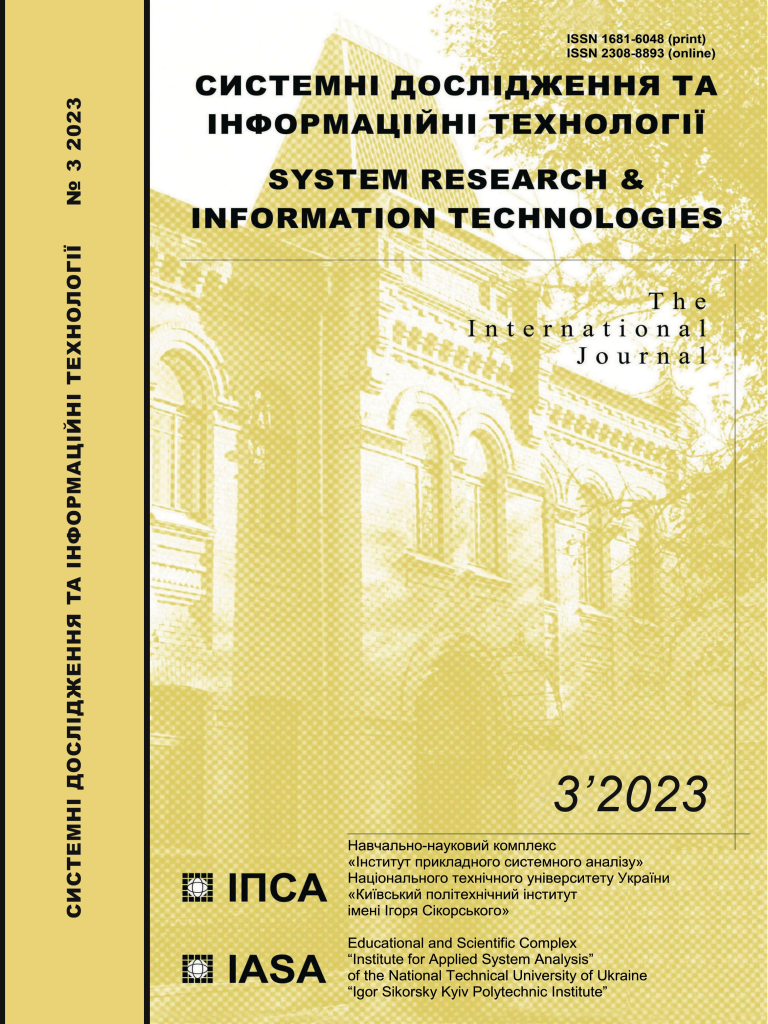Intelligent information system of the city's socio-economic infrastructure
DOI:
https://doi.org/10.20535/SRIT.2308-8893.2023.3.08Keywords:
modelling, information system, socioeconomic infrastructure, cityAbstract
Urban development is an important problem that can be solved with the help of intelligent information systems. Such systems ensure efficient management of the city’s diverse infrastructure. The researchers developed a concept of such an information system based on a conceptual model and using data flow for intelligent decision-making. The system was tested for 1460 days in the city of Ternopil. The modelling results showed that the city’s central area is stable, with 50% of enterprises in the “growing” state and 70% of people in the “satisfactory” state. People often move to the northeastern and western zones due to higher levels of comfort and more affordable housing. However, the total distance of car trips has increased by 249%, negatively impacting the environment. The condition of enterprises in other zones is less stable with lower “growth” indicators, but there are zones with “stable” and “satisfactory” conditions.
References
A.U.B Usmonjon o’g’li and I.B. Botirali o’g’li, “The Essence and Normative Indicators of Economic Security,” Academic Journal of Digital Economics and Stability, vol. 15, pp. 1–15, 2022.
S.I. Sotskova and I.V. Kalashnikova, “Comprehensive Assessment of Enterprise’s Economic Security System in the Digital Economy Conditions,” in Ashmarina S.I., Mantulenko V.V. (eds) Digital Technologies in the New Socioeconomic Reality. ISCDTE 2021. Lecture Notes in Networks and Systems, vol. 304. Springer, Cham, 2022. doi: 10.1007/978-3-030-83175-2_64.
L. Lelyk, V. Olikhovskyi, N. Mahas, and M. Olikhovska, “An integrated analysis of enterprise economy security,” Decision Science Letters, 11(3), pp. 299–310, 2022.
O. Hrybinenko, O. Bulatova, and O. Zakharova, “Financial indicators in the system of economic security of the world countries,” 11th International Scientific Conference “Business and Management 2020”, pp. 273–281.
T. Obelets, “Data mining tools for complex socioeconomic processes and systems,” System Research and Information Technologies, no. 4, pp. 68–78, 2022.
R. Khajouei and F. Farahani, “The evaluation of users’ satisfaction with the Social Security Electronic System in Iran,” Health Technol., 9(1), pp. 797–804, 2019. doi: 10.1007/s12553-019-00347-y.
E. Weber, Digital Social Security: Outline of a concept for the 21st century, Working Paper Forschungsförderung, No. 138. Hans-Böckler-Stiftung, Düsseldorf, 2019.
O. Trofymchuk, A. Stenin, M. Soldatova, and I. Drozdovich, “Intelligent decision support systems in the development of megalopolis infrastructure,” System Research and Information Technologies, no. 2, pp. 61–74, 2022. doi: 10.20535/SRIT.2308-8893.2022.2.04.
T. Yigitcanlar, J.M. Corchado, R. Mehmood, R.Y.M. Li, K. Mossberger, and K. Desouza, “Responsible Urban Innovation with Local Government Artificial Intelligence (AI): A Conceptual Framework and Research Agenda,” Journal of Open Innovation: Technology, Market, and Complexity, 7(1):71, 2021. doi: 10.3390/joitmc7010071.
J. Wang, D.Q. Nguyen, T. Bonkalo, and O. Grebennikov, “Smart governance of urban data,” in E3S Web of Conferences, vol. 301, pp. 1–8, 2021.
D. Jung, V. Tran Tuan, D. Quoc Tran, M. Park, and S. Park, “Conceptual Framework of an Intelligent Decision Support System for Smart City Disaster Management,” Applied Sciences, 10(2):666, 2020. doi: 10.3390/app10020666.
M. Mansouri and N. Khansari, “A Conceptual Model for Intelligent Urban Governance: Influencing Energy Behaviour in Cognitive Cities,” in Portmann E., Tabacchi M., Seising R., Habenstein A. (eds) Designing Cognitive Cities. Studies in Systems, Decision and Control, vol 176. Springer, Cham, 2019. doi: 10.1007/978-3-030-00317-3_8.
K.A. Achmad, L.E. Nugroho, and A. Djunaedi, “Smart city for development: towards a conceptual framework,” in 2018 4th International Conference on Science and Technology (ICST), pp. 1–6.
State Statistics Service of Ukraine. Available: https://ukrstat.gov.ua/
AnyLogic Cloud: Online Simulation Tools. AnyLogic Cloud: Online Simulation Tools. Available: https://cloud.anylogic.com/model/dc9cf4ee-0463-4324-92be-f13f394fe840?mode=SETTINGS&tab=GENERAL
K. Lipianina-Honcharenko, C. Wolff, Z. Chyzhovska, A. Sachenko, T. Lendiuk, and S. Grodskyi, “Intelligent method for forming the consumer basket,” Information and Software Technologies, 2022. doi: 10.1007/978-3-031-16302-9_17.
H. Lipyanina, S. Sachenko, T. Lendyuk, V. Brych, V. Yatskiv, and O. Osolinskiy, “Method of detecting a fictitious company on the machine learning base,” Advances in Computer Science for Engineering and Education, 2021. doi: 10.1007/978-3-030-80472-5_12.
K. Lipianina-Honcharenko, R. Savchyshyn, A. Sachenko, A. Chaban, I. Kit, and T. Lendiuk, “Concept of the intelligent guide with AR support,” International Journal of Computing, 21(2), pp. 271–277, 2022. doi: 10.47839/ijc.21.2.2596
V. Krylov et al., “Multiple regression method for analyzing the tourist demand considering the influence factors,” Paper presented at the Proceedings of the 2019 10th IEEE International Conference on Intelligent Data Acquisition and Advanced Computing Systems: Technology and Applications, IDAACS 2019, pp. 974–979. doi: 10.1109/IDAACS.2019.8924461.

